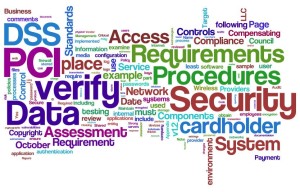May 8th, 2014 by Elma Jane
The complexity derives from PCI’s Data Security Standards (DSS), which include up to 13 requirements that specify the framework for a secure payment environment for companies that process, store or transmit credit card transactions.
Make PCI DSS Assessment Easier
Training and educating employees. Technical employees should obtain any certifications or training classes necessary so that they can operate and monitor the security control set in place. Non-technical employees must be trained on general security awareness practices such as password protection, spotting phishing attacks and recognizing social engineering. All the security controls and policies in the world will provide no protection if employees do not know how to operate the tools in a secure manner. Likewise, the strongest 42-character password with special characters, numbers, mixed case, etc. is utterly broken if an employee writes it on a sticky note attached to their monitor.
For an organization to effectively manage its own risk, it must complete a detailed risk analysis on its own environment. Risk analysis goal is to determine the threats and vulnerabilities to services performed and assets for the organization. As part of a risk assessment, organization should define critical assets including hardware, software, and sensitive information and then determine risk levels for those components. This in turn allows the organization to determine priorities for reducing risk. It is important to note that risks should be prioritized for systems that will be in-scope for PCI DSS and then other company systems and networks.
Once the risk assessment has been completed the organization should have a much clearer view of its security threats and risks and can begin determining the security posture of the organization. Policies and procedures form the foundation of any security program and comprise a large percentage of the PCI DSS requirements. Business leaders and department heads should be armed with the PCI DSS requirements and the results of the risk analysis to establish detailed security policies and procedures that address the requirements but are tailored to business processes and security controls within the organization.
Building upon the foundation of security policies, the committee of business leaders and department heads should now review the PCI DSS requirements in detail and discuss any potential compliance gaps and establish a remediation plan for closing those gaps. This is where it is important to have the full support of business leaders who can authorize necessary funds and manpower to implement any remediation activities.
This is also the time to schedule the required annual penetration testing. These are typically performed by third parties, but is not required to be performed by third parties, and can take some time to schedule, perform, and remediate (if necessary). The results of a PCI DSS assessment will be delayed until the penetration test is completed so now is the time to schedule the test.
At this point the organization is ready for a full-scale PCI DSS assessment and can now enter a maintenance mode where periodic internal audits occur and regular committee meetings are held to perform risk assessments and update policies, procedures, and security controls as necessary to respond to an ever changing threat landscape. PCI DSS must become integrated into the everyday operation of the organization so that the organization remains secure and to ease the burden of the annual assessments.
Payment Card Industry (PCI) compliance assessment is a major task for any size organization, but you can make it easier.
Posted in Best Practices for Merchants, Credit Card Security, Payment Card Industry PCI Security Tagged with: assets, card, card transactions, compliance, compliance assessment, credit card transactions, credit-card, data security standards, DSS, networks, password protection, payment, Payment Card Industry, PCI, Phishing, process, risk, risk analysis, risk assessment, secure payment, Security, security control, security policy, transactions, transmit
May 6th, 2014 by Elma Jane
Which fee structure works best remains unclear despite the recent high-profile data security breaches that are emphasizing the need for security measures. Acquirers charge fees – or not – based on what’s best for their business model and their security objectives
Some charge merchants that comply, others charge merchants that fail to comply and a few charge both. Some Independent Sales Organizations (ISOs) don’t charge merchants a fee for helping them comply with the Payment Card Industry data security standards (PCIS DSS).
If there is any trend, it’s that more banks are finding that some sort of funding is necessary to run a program that gets any results. That funding covers costs for security assessments and compliance assistance as well as internal resources for acquirers. When it comes to covering those costs and creating incentives for compliance, no one fee structure is ideal.
Non-compliance fees encourage merchants to comply so they can save money, but the fees may not accomplish that. Unless you charge exorbitantly, it’s not going to have the effect you want it to have, and by the time you charge that much, the merchant’s just going to move to a different ISO.
ISOs charging non-compliance fees often claim the fee revenue goes into an account designated for use in case of a breach. Non-compliance fees can also reward acquirers for doing nothing to increase compliance. You get this situation where a bank has a revenue stream. Their objective is not to increase the revenue stream but to increase compliance, when they increase compliance, the revenue stream goes down.
It is recommended to some acquirers that they consider charging merchants fees for doing things like storing card data, which could be checked with a scanning tool. Merchants that do store data or fail to run the scan would be charged a fee. That is something that could really decrease risk, because if you’re not storing card data, even if you are breached, there’s nothing to get.
Simplifying the compliance verification process, by making assessment questionnaires available on its merchant portal and by teaching merchants about PCI, will minimize the potential impact of fraud by increasing compliance, which saves the company money in the long run versus a more laissez-faire approach of fees without education and compliance tools.
It’s more important to educate the merchant, it’s the spirit and intent of PCI-DSS supported by the card associations. Visa and MasterCard support it because of the severe impact of a breach or other data compromise, not as a revenue source.
ISOs and other players in the payments chain that do not work to help merchants comply are also putting themselves at risk. Breached merchants may be unable to pay fines that come with a data compromise, potentially leaving ISOs responsible for paying them. Merchants that go out of business because of a data breach also stop providing the ISO with revenue.
Plus, when merchants ask why they’re being charged a non-compliance fee, point them to the questionnaire and explain that they’ll stop being charged as soon as they demonstrate they comply with PCI.
Posted in Best Practices for Merchants, Credit Card Security, Merchant Account Services News Articles, Payment Card Industry PCI Security Tagged with: card associations, card data, compliance, compliance fee, data, data security standards, ISOs, MasterCard, Merchant's, Payment Card Industry, portal, security breaches, visa

